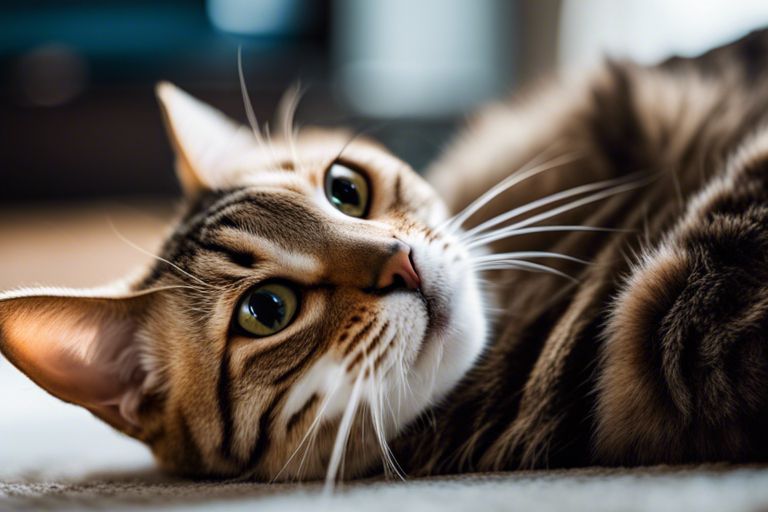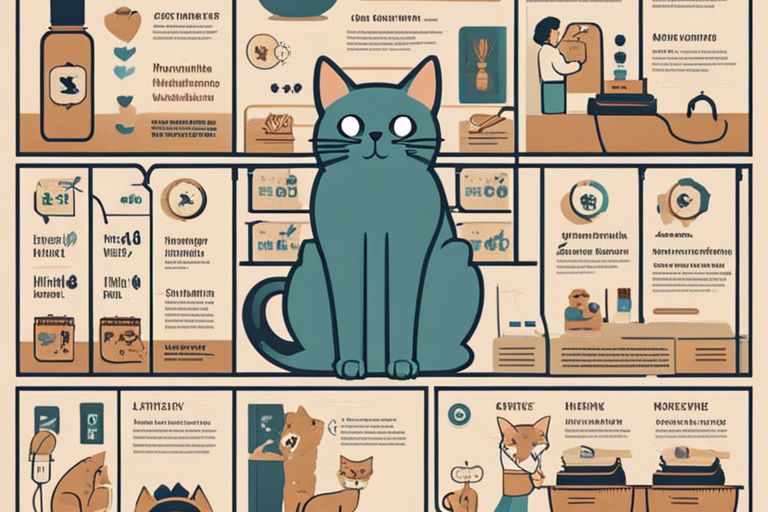Have you ever noticed that your beloved feline friend seems to be excessively scratching and licking itself? This behavior is not only annoying, but it could also be a sign of an underlying issue that needs to be addressed. Constant scratching and licking can be a result of parasites, allergies, skin infections, or stress in your cat. It’s important to monitor your cat’s behavior and take action to address the problem before it escalates. In this blog post, we’ll discuss the reasons why your cat may be exhibiting this behavior and what you can do to help alleviate their discomfort.
Key Takeaways:
- Itchy Skin: Constant scratching and licking may be a sign of itchy skin, which could be caused by allergies, parasites, or a skin condition.
- Stress or Anxiety: Cats may excessively groom themselves when they are stressed or anxious, leading to irritation and skin problems.
- Health Issues: Constant scratching and licking could also be a symptom of an underlying health issue, such as an infection or hormonal imbalance.
- Dietary Factors: Poor diet or food allergies can lead to skin irritation, causing a cat to scratch and lick itself excessively.
- Grooming Habits: Some cats may simply have compulsive grooming habits, leading to excessive scratching and licking even without an underlying issue.
Common Causes of Scratching and Licking
Some common reasons why your cat may be constantly scratching and licking itself include parasites, allergies, skin conditions, psychological factors, and boredom.
Parasites: Fleas, Mites, and More
If your cat is scratching excessively, it could be a sign of an infestation of parasites such as fleas, mites, or ticks. These tiny creatures can cause intense itching and discomfort for your pet. Regular flea prevention measures and routine check-ups by your veterinarian can help keep these pests at bay.
Allergies: Food, Environmental, and Contact Irritants
Allergies to certain foods, environmental factors, or contact irritants can also lead to excessive scratching and licking in cats. Identifying and eliminating the allergen through allergy testing or an elimination diet can bring relief to your cat and improve their comfort and well-being.
Skin Conditions: Infections and Diseases
Underlying skin conditions such as infections or diseases can lead to persistent scratching and licking. Conditions like dermatitis, ringworm, or bacterial infections can cause discomfort and require veterinary attention for proper diagnosis and treatment.
Psychological Factors: Stress and Anxiety
Stress and anxiety can manifest in cats as excessive grooming behavior, leading to irritation and skin problems. Environmental changes, new pets, or disruptions to your cat’s routine can trigger these psychological factors. Creating a calm and consistent environment for your feline friend can help alleviate their stress and reduce excessive grooming.
- Separation anxiety from you or other pets
- Changes in the household or routine
- Boredom or lack of mental stimulation
Though addressing these psychological factors may require patience and time, it is essential for the well-being of your cat.
Boredom and Habitual Behavior
In some cases, boredom or habitual behavior can lead to excessive scratching and licking. Providing enrichment activities, toys, and interactive playtime can help alleviate boredom and redirect your cat’s focus away from excessive grooming.
Diagnostic Approaches
For diagnosing the underlying cause of your cat’s constant scratching and licking, your veterinarian will employ a variety of diagnostic approaches. These may include a physical examination, blood tests, skin scrapings, and possibly even allergy testing. By conducting a thorough evaluation, your vet can rule out various potential causes and determine the most appropriate course of action to address your cat’s symptoms.
When to Consult the Vet
If you notice your cat is scratching and licking excessively, it’s essential to consult your vet promptly. Constant scratching and licking can indicate a range of issues, from allergies and dermatitis to parasites and even more serious health conditions. Identifying the underlying cause early on can make a significant difference in your cat’s treatment and overall well-being.
Expected Diagnostic Tests and Examinations
When you take your cat to the vet for excessive scratching and licking, they will likely start by performing a physical examination to assess your cat’s skin, fur, and overall health. Depending on their findings, they may recommend blood tests to check for underlying health issues, skin scrapings to identify potential infestations, and even allergy testing to determine if your cat’s symptoms are related to environmental or food allergens. These tests and examinations will help your veterinarian pinpoint the cause of your cat’s discomfort and develop a targeted treatment plan to address it.
Treatment and Management Options
Noticing your cat constantly scratching and licking itself can be frustrating, but there are various treatment and management options available to address the underlying causes of this behavior. By taking a proactive approach, you can help alleviate your cat’s discomfort and improve its overall well-being.
Medical Treatments for Parasites and Infections
If your cat’s excessive scratching and licking is due to parasites such as fleas or mites, your veterinarian may recommend a specific treatment plan to eliminate the infestation. This may include topical or oral medications to kill the parasites and prevent reinfestation. Additionally, if your cat is suffering from a bacterial or fungal infection, your vet may prescribe antibiotics or antifungal medications to clear up the issue.
Dietary Adjustments and Allergy Management
Another potential cause of your cat’s behavior could be food allergies or sensitivities. Your vet may recommend dietary adjustments such as a hypoallergenic diet to pinpoint and eliminate the trigger. Additionally, if environmental allergens are the culprit, your vet may suggest strategies for minimizing exposure and managing your cat’s allergies, such as using air purifiers or changing bedding materials.
Behavioral Therapies and Environmental Enrichment
Considering your cat’s scratching and licking behavior may also have a behavioral component, implementing enrichment activities and environmental changes can help redirect your cat’s focus and alleviate stress. Providing interactive toys, scratching posts, and creating a stimulating indoor environment can help keep your cat mentally and physically engaged, reducing the urge to excessively groom and scratch.
Alternative Remedies and Preventive Care
In addition to conventional medical treatments, there are alternative remedies and preventive care measures that may be beneficial for managing your cat’s scratching and licking. Some natural supplements, such as omega-3 fatty acids, can help improve your cat’s skin and coat health. Regular grooming, including flea combing and bathing with a gentle, cat-safe shampoo, can also contribute to preventive care. Always consult with your vet before starting any new supplements or treatments.
Owner’s Role in Feline Health
After noticing your cat constantly scratching and licking itself, it’s important to understand that your role as an owner is crucial in maintaining your feline friend’s health. By being proactive and taking certain steps, you can help alleviate your cat’s discomfort and prevent any serious health issues from developing. For more detailed information on this topic, you can check out this informative article on My Pet Won’t Stop Chewing, Scratching, and Licking His Skin.
Recognizing Signs of Discomfort
One of the first steps in addressing your cat’s incessant scratching and licking is to recognize the signs of discomfort. Is your cat excessively grooming itself, causing hair loss or raw, irritated skin? Are there any visible lesions or scabs? These could all be indications of an underlying issue that needs attention.
Daily Check-Ups and Grooming Tips
Performing daily check-ups on your cat and following grooming tips can help you stay on top of their health. Regularly examine your cat’s skin and coat for any changes or abnormalities. Use a fine-toothed comb to check for fleas or ticks, and ensure their claws are trimmed to prevent overgrowth. Any unusual findings should be brought to the attention of your veterinarian for further evaluation.
- Check for fleas or ticks
- Regularly trim your cat’s claws
- Examine skin and coat for any changes
Remember, grooming is not only about appearance, but also about your cat’s overall well-being.
Creating a Stimulating and Comfortable Environment
It’s important to create a stimulating and comfortable environment for your cat to minimize stress and anxiety, which can contribute to excessive grooming. Provide plenty of interactive toys, scratching posts, and cozy resting areas to keep your feline friend engaged and content. Additionally, ensure that your cat has access to a clean and calm living space, away from any potential sources of distress.

Why is my cat constantly scratching and licking itself?
From above, it’s important to understand that your cat’s constant scratching and licking itself could be a sign of an underlying health issue, such as allergies, skin irritation, or parasites. It’s crucial to monitor your cat’s behavior and consult with a veterinarian to properly diagnose the root cause of the excessive scratching and licking. Your veterinarian can provide the necessary treatment and recommendations to alleviate your cat’s discomfort and improve their overall well-being. By addressing the issue promptly, you can ensure a happier and healthier life for your feline friend.
FAQ
Q: Why is my cat constantly scratching and licking itself?
A: There are several reasons why a cat may exhibit this behavior. It could be due to allergies, skin irritations, parasites such as fleas or mites, or even stress. It’s important to consult with a veterinarian to determine the root cause.
Q: How can I determine if my cat’s scratching and licking is due to allergies?
A: If your cat’s scratching and licking is accompanied by red, inflamed skin, hair loss, or recurring ear infections, it may be indicative of allergies. Allergies in cats can be caused by food, environmental factors, or even certain grooming products. A vet can perform tests to identify the specific allergen.
Q: What can I do to help my cat with its constant scratching and licking?
A: Regular grooming and keeping your cat’s environment clean can help minimize irritation. It’s important to use flea prevention products and maintain a consistent diet to reduce the likelihood of allergies. Additionally, providing mental and physical stimulation for your cat can help reduce stress-related behaviors. If the issue persists, consult with a veterinarian for a proper diagnosis and treatment plan.

Jayley, a devoted cat enthusiast, also writer for other cat blog as well. She aims to dedicated to providing comprehensive information, insights, and advice on everything you’d ever want to know about our whiskered companions.
